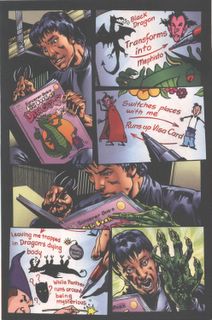A picture is not worth a thousand words

Marvel 'Nuff Said month, 2002
Right in the middle of 'Nuff Said month, I stopped buying comic books altogether.
So I can have a guess at how your comic book collecting career is going to end. Your interest in comics will slowly decline. You'll buy less and less. You'll stop reading the ones you do buy. You just won't enjoy them anymore. You won't send an indignant letter to Stan ("How could you betray me so?") or put an aggrieved posting on a bulletin board. One evening, you'll look at the horizontal rain slashing outside, think of the ever-more-youthful people in the comic shop, and decide not to go this week. And that'll be it.
'Nuff Said month must have sounded great in the editorial meeting where it was formulated. As Marvel put it:
"Bill Jemas and Joe Quesada hatched a test for the Mighty Marvel Maestros: since you are the best artists and writers in the biz, we challenge you to tell a story using visuals only. After all, if a picture is worth a thousand words, then a comic book filled with images only would be worth... well, more words than the Collector could count!"
Perhaps this idea could catch on in hospitals - "We've got the best medical teams in the country, so for one month only our surgeons are going to be operating without anaesthetics".
What we got, then, was a month's worth of Marvel comics with no words. Or would have, if the writers hadn't kept cheating and included words anyway (see above). But they were bland. I picked them up, flicked through them and put them down again. Not a single one was memorable. I was pretty much off comics at the time, but 'Nuff Said month made it so easy to give them up.
I'm not arrogant enough to think that just because I'm the customer, I must be right - some customers are simply fools, and maybe I'm one of them. I can see what Marvel were trying to do, but it left me horribly cold. I didn't get angry about 'Nuff Said month, I just sighed apathetically.
The problem with 'Nuff Said month is that it only works if you accept the primacy of image over word. Most comic book fans, if they had to choose between art and writing, would probably choose art. Not me. I'll keep buying a well-written, badly drawn book, but I'll drop a badly written well-drawn one like dry-roast excrement. Quesada's logic was that fans would be intrigued by, might even find they loved, this experiment. I just found ten or fifteen identical products, sucked of what makes them distinctive, sitting in a pile, unloved and unreadable.
I can see the argument that writers were still involved in plotting, but that's to miss the point. A plot is a product of words, but it's not words themselves. Words written down are powerful. Should be powerful. Without them, comic books are fatally diminished.
I'm frustrated that narrative captions have all but disappeared from modern comic books. One of the CBR commentators (sorry, can't remember which one) said recently he had problems with captions, that they were old-fashioned. Who exactly decided that, then? Why has narration, mainstay of literature since its infancy, suddenly become outmoded? Sure, used badly, narration is overbearing (Roy Thomasesque - "and the man known only as Giant-Man returns to the shadows"), but then think of how bad you find the work of your least favourite artist, whoever that might be. The ridiculous pneumatic breasts which grew on characters like Rogue in the early 1990s were vastly more embarrassing than poor narration.
Obviously, I eventually started buying comics again, but my point stands. Hand on heart, I would choose one beautifully crafted sentence from Don McGregor over the complete output of 'Nuff Said month.



0 Comments:
Post a Comment
<< Home